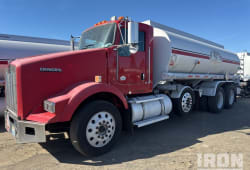Tips How to Choose the Right Service trucks?
9 Min read
)
November 25, 2023
Service trucks play a crucial role in various industries, serving as mobile workshops, maintenance units, and logistical support on wheels. Their versatile nature makes them indispensable for businesses that rely on a fleet for efficient operations. Whether you're in construction, utilities, or emergency services, selecting the right service truck is essential for maximising productivity and ensuring that your investment aligns with your specific needs.
The Need for an Informed Decision
Choosing the right service truck involves a careful consideration of various factors. From the intended application to the specific features that meet your requirements, a well-informed decision can significantly impact your business's efficiency and overall success. In this article, we will explore the key aspects of service truck selection, highlight their essential features, and provide insights into customization options, maintenance considerations, and future trends.
Service Trucks Selection
Key Considerations
Service Trucks Selection, it's crucial to assess its purpose and application. Different industries have distinct requirements, and understanding how the truck will be used is fundamental to making the right choice. Consider factors such as the type of equipment you'll need to carry, the frequency of use, and the working environment.
Size and capacity are also vital considerations. Ensure that the service truck has adequate space to accommodate your tools and equipment while maintaining a manageable size for navigation and accessibility. Mobility and accessibility, including features like a well-designed ladder or hydraulic lift, are critical for efficiency and safety.
:format(webp))
Popular Brands and Models
Several brands offer reliable service trucks, each with its own set of features and advantages. Ford, Chevrolet, and Ram are among the most popular brands, known for their durable and efficient service trucks. Ford service trucks, for instance, are recognized for their robust build and versatile design, catering to a wide range of industries. Chevrolet service trucks are known for their reliability, while Ram service trucks often boast innovative features and technology.
Service Trucks Features
The engine and performance of a service truck are the beating heart that determines its capability to meet the rigorous demands of various tasks. Choosing the right engine is paramount, as it directly influences the truck's power, efficiency, and overall reliability. When assessing different models, it's crucial to delve into key specifications such as horsepower, torque, and fuel efficiency.
Horsepower and Torque: The Power Duo
Horsepower and torque are vital indicators of an engine's strength and capability. Horsepower represents the engine's overall power output, influencing the truck's ability to carry heavy loads and navigate challenging terrains. Torque, on the other hand, measures the engine's rotational force, crucial for tasks such as towing and acceleration. A careful balance between horsepower and torque ensures that the service truck can deliver optimal performance across a range of applications.
Fuel Efficiency: Maximising Operational Economy
Fuel efficiency is a critical consideration, especially in an era where environmental consciousness and operational cost-effectiveness are at the forefront. A service truck with good fuel efficiency not only reduces operating costs but also minimises its carbon footprint. Evaluate the fuel consumption rates under different operating conditions to ensure that the truck aligns with your budgetary and environmental goals.
Transmission System: Smooth Operation in Diverse Conditions
The transmission system is the unsung hero behind the scenes, ensuring that the engine's power is seamlessly transferred to the wheels. A well-designed transmission system enhances the truck's ability to handle various terrains and loads while providing smooth acceleration and deceleration. Consider automatic or manual transmission options based on your operational preferences and the skill level of your drivers.
Storage and Compartments: Organising Efficiency
Efficient organisation of tools and equipment is a hallmark of a well-designed service truck. The storage and compartmentalization of tools not only enhance accessibility but also contribute to a safer and more productive work environment. When evaluating a service truck's storage features, consider the following aspects:
Layout and Accessibility: Intuitive Design for Productivity
The layout of compartments should be intuitive, allowing for easy access to tools without unnecessary delays. A well-organised interior ensures that every tool has its designated space, reducing the risk of damage and streamlining workflow. Consider features like slide-out drawers, adjustable shelving, and strategically placed compartments for specialised equipment.
Material Durability: Withstanding Environmental Challenges
The materials used for storage compartments play a pivotal role in the overall durability of the service truck. Harsh environmental conditions, such as extreme temperatures or exposure to corrosive substances, can take a toll on the longevity of storage units. Opt for materials that are not only robust but also resistant to corrosion, ensuring that the compartments can withstand the rigours of the job site.
Technology and Connectivity: The Digital Nerve Centre
In the age of digital transformation, modern service trucks are equipped with advanced technology to elevate efficiency and connectivity. The integration of cutting-edge features not only enhances operational capabilities but also contributes to better overall fleet management. When exploring the technology and connectivity aspects of service trucks, focus on the following:
GPS Navigation: Navigating with Precision
GPS navigation is a game-changer for service trucks, providing real-time location tracking and optimised routing. This feature not only aids in efficient route planning but also enables managers to monitor the movement of trucks, enhancing overall logistics and scheduling.
Real-time Diagnostics: Proactive Maintenance
Real-time diagnostics empower fleet managers with instant insights into the health of the service truck. Monitoring key metrics such as engine performance, fuel consumption, and potential issues allows for proactive maintenance, minimising downtime and reducing the likelihood of costly repairs.
Connectivity Options: Seamless Communication
Connectivity options, such as Wi-Fi and Bluetooth, facilitate seamless communication between the service truck and the central management system. This not only enables quick data transfer but also supports integration with other digital tools, enhancing overall workflow efficiency.
Aftermarket Modifications
One size does not fit all when it comes to service trucks. Aftermarket modifications provide the flexibility to tailor a truck to specific industry needs. Whether it's adding specialised storage, modifying the chassis, or incorporating custom features, aftermarket options allow businesses to create a service truck that aligns perfectly with their requirements.
Tailored Solutions for Specific Industries
Different industries have unique demands, and service trucks can be tailored to meet these specific needs. For example, a service truck for the construction industry may require additional storage for large tools, while a utility service truck may need specialised equipment for maintenance tasks. Understanding these industry-specific requirements is crucial for achieving optimal performance.
Maintenance and Durability
Longevity of Service Trucks
Investing in a service truck is a significant financial commitment, and ensuring its longevity is essential. Regular maintenance, adherence to manufacturer guidelines, and prompt repairs contribute to the overall durability of the truck. Consider the warranty offered by the manufacturer and the availability of replacement parts when assessing the long-term viability of a service truck.
Cost of Maintenance
While the initial cost of a service truck is a crucial factor, it's equally important to consider the ongoing costs of maintenance. Evaluate the availability and cost of replacement parts, as well as the reputation of the manufacturer for providing reliable support and service. A well-maintained truck not only lasts longer but also minimises downtime and repair expenses.
Case Studies
Successful Implementations
Examining successful implementations of service trucks in similar industries can provide valuable insights. Case studies showcasing how businesses have optimised their operations through the strategic use of service trucks can offer practical examples and highlight best practices.
Challenges and Solutions
Understanding the challenges faced by businesses in implementing service trucks allows for proactive planning. Whether it's addressing specific industry regulations, overcoming logistical hurdles, or optimising workflow, identifying potential challenges and exploring solutions ensures a smoother integration of service trucks into your operations.
Future Trends in Service Trucks
Technological Advancements
The future of service trucks is undoubtedly tied to technological advancements. From the integration of artificial intelligence for predictive maintenance to the development of autonomous service vehicles, staying informed about emerging technologies is crucial for making forward-looking decisions.
Sustainability and Green Solutions
As environmental concerns continue to grow, the demand for sustainable and eco-friendly service trucks is on the rise. Manufacturers are exploring alternative fuel options, electric propulsion systems, and lightweight materials to create greener solutions. Considering the environmental impact of service trucks aligns with broader corporate social responsibility goals.
The Bottom Line
Choosing the right service truck requires a comprehensive evaluation of your business's specific needs, industry requirements, and future considerations. By carefully considering the key aspects of service truck selection, understanding Service truck features, exploring customization options, and planning for maintenance and durability, businesses can make informed decisions that contribute to operational efficiency and long-term success. Stay abreast of emerging trends to ensure that your service trucks remain at the forefront of technological innovation, positioning your business for sustained growth and competitiveness in the ever-evolving landscape of fleet management.
Visit Boom & Bucket to buy and sell your machinery.

Rex Walz is Boom & Bucket's Manager of Supplier Relations, bringing over a decade of experience in B2B sales and heavy equipment solutions. With a background spanning government, construction, industrial, and commercial sectors, he has a proven track record of driving growth and building trusted customer relationships. At Boom & Bucket, Rex is passionate about helping partners succeed while advancing the company's mission to create the most trusted marketplace for heavy equipment.














